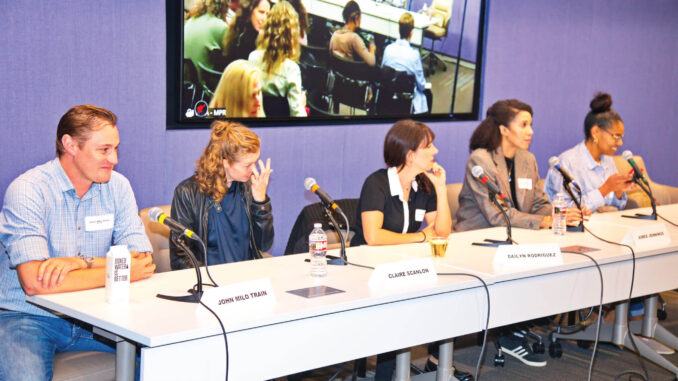
By Kristin Marguerite Doidge
TV writers are often thrown into episodic post-production without much training, and yet, editors know that the value of strong communication and collaboration between writing and editing cannot be overstated.
That’s why the Guild’s Women’s Steering Committee (WSC) worked together with the Writers Guild of America West’s Committee of Women Writers and Writers Education Committee to put together the first “TV Writers & Post Production” educational panel event on Sept. 19 to discuss the most important things post-production professionals want writers to know, and vice versa.
More than 180 people attended in person at the WGAW headquarters in Los Angeles and online via Zoom. Panelists included MPEG WSC co-chair and picture editor Aimee Jennings (“S.W.A.T.,” “The Other Black Girl”), post-production supervisor Jacqueline Hernandez (“Forever,” “Riverdale”), TV director and former editor Claire Scanlon (“The Office,” “Loot”), sound mixer John Milo Train (“Chicago P.D.,” “For All Mankind”), and co-showrunner and WGAW board of directors member Dailyn Rodriguez (“The Lincoln Lawyer,” “Queen of the South”). The discussion was moderated by writer Molly Moseley (“Call Me Kat”).
The program came together after hundreds of emails and months of hard work from the dedicated committees at both guilds. The idea was conceived as part of the Guild’s WSC’s Lift Up Women mentorship program, which was launched in March of last year, and aims to support women from all post-production classifications to develop their craft and find meaningful advancement in their careers.
“We’re all storytellers, we just have different mediums of working,” said Diana Fishman, picture editor and co-chair of the Guild’s WSC, prior to the event. “And so to see it as a partnership—that we’re trying to help them tell the story they envisioned and that we’re on the same team—then we can help each other.”
The panelists discussed the typical timeline and workflow for a TV episode, from production through the editorial process and all the way to network or studio reviews. They also talked about notes etiquette and basic post-production lingo/vocabulary.
“If you’re lucky [to be] on a show that has time and a little bit of money…a concept meeting happens first, your first day of working,” Scanlon said. “At the concept meeting, that’s when everyone throws out the pie in the sky, blue-sky ideas. And then by the time you have your production meeting halfway through the week—that’s where people start killing dreams. We don’t have the money, we don’t have this, we don’t have that. And start answering those questions. It’s kind of like a call and response. The concept meeting is the call, the production meeting is where you come grounded back down to earth. And then the tone meeting is where you really lock in what the story is.”
One of the best ways to build a bridge between writers/showrunners and post-production while shaping the story, Jennings said, is to provide feedback to editors that helps them better understand your intent with a particular scene instead of giving overly prescriptive notes. “Telling me what frames to take off is offensive to an editor,” she explained. “I do like the general, ‘this scene feels slow’…a slow feel I could work with. If you want to pace it up, that’s a note I can take, and can start trimming some fat where I see fit.”
The pros also recommended that writers try to engage with post-production early on, even before their specific episode, to provide input and to help build relationships, but noted that this can depend on the preferences of the showrunner.
For Rodriguez, for example, she feels it’s all about sharing knowledge.
“When I took over ‘Queen of the South,’ …I didn’t have a lot of editorial experience, and so when I sat down with the editor of the first episode of Season Four, I took one look at him and I said, ‘I don’t have a lot of experience. I need you to teach me. I need you to hold my hand a little bit. I may have an instinct about something, but I’m not sure or I don’t understand some of your vocabulary. There are things I’m just not going to understand,’” she said. “I’m just going to have an instinct about story because I’m a writer, but there are some things I won’t understand, or I won’t understand why you can’t do something like miraculously figure something out in post…there were things that I needed to learn, and when I said to him, ‘I need you to teach me,’ …what happens when you do that is that people become invested in your success.”
To that end, the panelists said they feel showrunners should invite writers to be involved throughout the production process, from the tone meeting to the mix stage, to get their input and see their work come to life on the screen.
Still, the post-production pros cautioned, remember: we can’t just ‘fix it in post’ without impacting the schedule or budget—and that’s what makes this ongoing collaboration between production and post-production departments so important.
“You have to go back to the triangle of life: if you want it to be good, it’s going to cost. If you don’t want it to cost, and you want it good, it’s going to take time. And if you don’t want the time and you don’t have the money, it may not be good,” Hernandez said. “Now, there are some things that you can avoid greatly if you had just asked before you even got to post, like ‘oh, I think we need to do this, and I want to shoot it through the glass. How can I get it without the glass? But I need the glass.’ Shoot the glass, and then shoot it without the glass, and then we’ll make it work.”
To put a finer point on it, Train added, “if you’re on the mix stage, the Titanic is halfway across the Atlantic. You don’t have many choices at that point…you’ve got to get it in the script in the beginning.”
In the future, the WSC hopes to partner with the DGA and PGA as well, and to make educational programs like this one a quarterly event.





